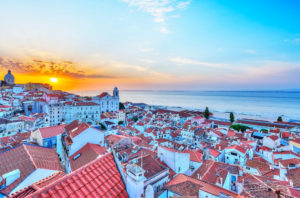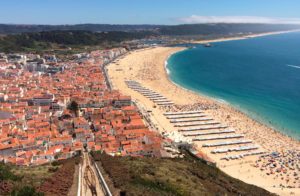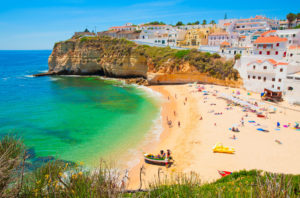Administrative procedures to settle in Portugal
Are you looking for a property to settle in Portugal?
Are you looking for a property to settle in Portugal?
You have chosen to settle in Portugal, what are the formalities to complete once you get there?
Beyond all the formalities to be completed before your departure, you will need to tackle many practical and administrative procedures once you arrive. The number of administrations involved is also high and some deadlines very tight, turning this process into a real obstacle course!
Here is an overview of the formalities to complete in the days following your arrival (non-exhaustive list)
It is important to note that you cannot carry out any official or legal activities in Portugal without obtaining a NIF (fiscal identification number): it is key to starting your new life in Portugal. You will be asked for it everywhere, it is therefore the first stage of any newcomer’s obstacle course…
It is obtained on request by presenting you identification papers.
This is obtained from the civil parish (junta de freguesia) of the district where you live by presenting proof of address.
You will need to hand over the European Union S1 form obtained in your country of origin before departure if applicable). You will then be allocated to a health centre.
This process can take up to 2/3 months.
You have 6 months to complete the change of registration of your vehicle but the sooner the better, partly to avoid being regularly stopped.
Be aware that Portugal imposes quite a high import tax on vehicles.
The procedure for the registration of your vehicle is long and complex and requires obtaining many elements that are part of a compulsory process: 6 distinct stages, to carry out in sequence, as very few can be performed in parallel.
Registration with the Consulate of your country of origin is strongly recommended. This will allow you to register on the voter’s roll and receive important information from the consulate.
Must be provided yearly to your pension provider (if applicable)

The Portuguese NHR status is very interesting if, retired or not, you decide that you want to start working or you want to continue your professional activity in Portugal.
A flat rate of 20% for 10 years
The net incomes from salaried work (employee) or independent (freelance, self-employed, business activities…) are taxed for ten years at a flat rate of 20% if they fall within a high added value activity and / or are of scientific, artistic or technical nature.
Do not be concerned about this apparently restrictive definition. The list of professions covered is in reality very broad. A Portuguese Decree of 7 January 2010 provides a list of these professions.
They are wide-ranging and include architects, sculptors, engineers, singers, musicians, painters, doctors, dentists, biologists, university professors, tax consultants, computer specialists, senior managers…
In any case, please ensure that you meet all the conditions when your request your NHR status to claim the 20% rate.
For example, you will be considered a senior manager if you have a “management position giving you decision-making powers in the business that employs you”. Directors and business owners will have to provide documents confirming their status.
Everything hinges on the proper presentation of your application and the quality of your lawyer.
All other incomes, Portuguese or foreign, will follow the same regime that applies to non-habitual residents.
Tip: it may be better not to maintain a professional activity in your home country. Your profits may be charged back home rather than in Portugal.
After 10 years in Portugal
After 10 years in Portugal, you become liable for the standard tax regime based on a rapidly progressive scale, ranging from 14.5% to 48%. You can leave the country for five years to then benefit from a new ten-year period of exemption or moderate taxation. But when you leave, you will lose the benefits of the Portuguese tax system, starting with the absence of wealth tax.
In addition, there is no inheritance tax between direct line ascendants or descendants, between spouses or partners. For transfers to other persons, only a stamp duty of 10% is levied on the transferred assets. Let’s compare this with the prohibitive taxation in place in some other European countries like France as soon as the transfer is not in direct line: 55% for nephews, 60% for distant cousins or a partner.
For this rate of 10% to be applicable and to avoid taxation in your home country, all your assets must be in Portugal and your heirs must be resident in Portugal. In any case, we strongly recommend that you consult a lawyer in your home country and in Portugal. Please note, however, that Portugal is currently reconsidering these moderate succession rights.
Today:
Between 500 and 700 shops, restaurants, cafes, B and B or bakeries are created each year thanks to this system. Some of the “high added value” professionals that boost the local employment levels are also settling in Portugal. Many lawyers or artists, such as Philippe Starck, have moved to Portugal. Like any pensioners, they can also benefit from the non-habitual resident status, allowing them to be exempt from taxes on their dividends, interest and capital gains and benefit from an income tax limited to 20% on their professional activity.
The net incomes from salaried work (employee) or independent (freelance, self-employed, business activities…) are taxed for ten years at a flat rate of 20% if they fall within a high added value activity and / or are of scientific, artistic or technical nature.
Tagus Property
The healthcare system and social security for foreign residents in Portugal
Placed in 12th position, Portugal is doing very well in the rankings issued by the World Health Organization. With its two sectors (public and private), the Portuguese healthcare system presents many similarities to other European countries. While it is possible to receive excellent care in the public sector, waiting times can be quite long depending on the urgency of your condition. This is one of the main reasons why people who can afford it turn to the private sector.
According to Portuguese consulting organizations, quality varies depending on location. You will find very good medical infrastructures in Cascais, Lisbon or Albufeira. Less so in other regions of the country. You don’t have a free choice of doctor in Portugal and a referral from the doctor at the health centre you are registered with is required to have access to specialists and hospitals.
If you are a citizen of the European Union, you will receive identical care and reimbursements like a Portuguese citizen thanks to the European social security agreements. To be eligible, you simply need to locally obtain a health insurance card.
You can use the private system, well developed but expensive to avoid the public system, slow and cumbersome, where waiting times for appointments can easily reach several months. So, it may be a good idea, prior to moving to Portugal, to consider signing up to a subscription-based complementary health cover for expatriates. Don’t forget that should you face a health difficulty or require specific care, you can always temporarily go home. Indeed, you may still be covered by your home country’s social security system.
Placed in 12th position, Portugal is doing very well in the rankings issued by the world health organization.
Tagus Property

Do I have to exchange my driving licence?
Holders of a driving licence issued by one of the countries of the European Union do not need to change their licence.
Drivers who establish residence in Portugal must, however, inform the IMTT (within 60 days), or face a fine.
To do so, you must submit the following documents:
Portugal has a tax on vehicles, the Imposto Sobre Veículos (ISV). It is imposed on all new vehicles purchased in Portugal and imported used vehicles.
The ISV is paid only once at the time of the first registration in Portugal.
This tax is calculated on the basis of a scale which considers the engine size and an ecological criterion (CO2 emissions and type of engine).
It can be particularly high; certain exemptions apply, and you should check if you can benefit from an exemption from this tax before starting the procedure to register your car.
The conditions are:
Registering your vehicle in Portugal can be a bit of an obstacle course partly because many supporting documents are required.
You must present your registration request within six months of transferring your residence to Portugal. After this period, you could be fined.
The documents required are:
You are allowed to import one vehicle per person to the country tax-free, but you must have owned the vehicle for six months.
Tagus Property

Contact our property finders in the Lisbon region to discuss your real estate project.
Read more
Use a hunter to find a house or apartment around Lisbon region.
Read more
Contact a property hunter to find your villa in the Algarve or your apartment by the sea in Portugal.
Read more